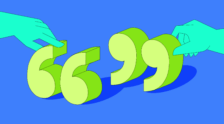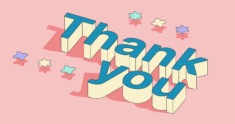
If ever it felt like the world was turned upside down, the COVID-19 pandemic added an even more vertigo-inducing tilt to things. But after the initial shock wears off, we’re left with questions: How do we go forward? How do we keep working and focusing on the things that are important to us when everything around us is deeply troubling?
To find out, we talked to three mental health experts. Here’s what they said:
What to do when bad news affects your focus at work
Be a curious observer
Monitoring your activity, particularly when it comes to “depressive content,” is a useful tactic for dealing with the difficulties of current events. Dr. Amishi P. Jha, Director of Contemplative Neuroscience at the Mindfulness Research & Practice Initiative at the University of Miami, says that asking yourself what you want to get out of something, like checking Twitter or Facebook, can help ensure that you stay on target and don’t end up in a doom-scrolling spiral.
“You’ve got to become meta-aware, moment by moment. Meaning, as you’re becoming engaged in a task,” she says, “it is a continuous process of monitoring and not arguing with yourself.” The more you work this meta-awareness into your day and get used to examining how things impact you, the easier it will become.
“Be curious about how [everything] is affecting you. Curiosity is the antidote to anxiety,” says Dr. Kathleen Smith, a D.C-based therapist and author of Everything Isn’t Terrible. “Approach it as a researcher. Like, ‘I’m going to observe myself in my natural habitat and see what patterns I see. Is there a different way of going about my day? Is there a thoughtful way to exist right now?’”
Set reasonable goals
“It’s a bad idea to have the goal that you should be positive and crushing it right now because, under high-stress circumstances, the amount of cognitive energy it takes to be positive can actually deplete you more,” says Dr. Jha. “Have a lower bar, accept it, just go through it, and do the things you have to do without adding the burden of having to be the most positive person.”
Asking yourself to work for five minutes, or breaking down your tasks into smaller pieces, for example, can be helpful ways to get yourself back on track.
“Don’t turn it into this all-or-nothing scenario,” adds Dr. Smith. “We tend to do that. But you have to be able to ask yourself, ‘how would I define what a good workday looks like in this crazy 2020 world?’”
>>READ MORE: How to Set SMART Goals
Work within healthy boundaries
For some, throwing themselves into work when the world feels like it’s on fire is a solid option. But there’s a catch: “Being busy is one way of calming yourself down. But I think if it’s the only tool that you have for managing anxiety then you’re going to get in trouble,” says Dr. Smith. “You can’t always count on your work being busy. You still need to be exercising, getting enough rest, eating well, all of the self-care basics you would expect.”
Again, part of setting healthy boundaries around work involves that meta-awareness of what you’re doing and how it’s impacting you. Dr. Smith, for example, says that she “can’t solve any of the world’s problems after 9 p.m.” Adding boundaries like that to your workday can help you avoid unproductively dwelling on negative thoughts and emotions. It’s about knowing the difference between anxiety and thoughtfulness, which can feel the same for some. But there is a way to tell the difference.
“To me, anxious focus is often trying to manage the thoughts and emotions of other people. Thoughtful focus is focusing on yourself. It’s asking, ‘what does it take to be a responsible employee?’” says Dr. Smith.
Take a “both-and” approach
Balance and flexibility are key to getting through these difficult times. So making room for both work and everyday life—the things that help make us feel like ourselves and keep us going—is important.
“You can be productive at work and also give yourself space and time to process, and to think about these thoughts and feelings and see how that’s coming out in your thoughts and behaviors,” says Dr. Thomas A. Vance, an Atlanta-based therapist. He adds that doing things like making a schedule or creating a morning routine, taking breaks to go outside, exercising, and drinking water are great ways to work that sense of balance into your day. And it’s those other activities which can help make us more productive, too.
“We have these rigid definitions of productivity and success,” says Dr. Smith. “Maybe we could get away with those last year, but now we need extra support more than ever.”
Keep your social connections alive
Social distancing guidelines are important. But so is keeping your social life intact. In fact, it’s part of what can help you stay motivated in difficult times.
“There are lots of ways to be physically distant but not socially distant,” says Dr. Vance. He suggests options like meeting others at parks to eat and be outside with a safe amount of distance. Online experiences are still valuable, and there have already been shifts in the technology we use that address the social needs that people have been lacking.
“Lots of dating profiles and platforms are now adding this video component where you’re able to video chat with the person you’re texting with,” says Dr. Vance. “We are naturally social beings. So figuring out what ways we can feel more connected, whether that’s via Instagram or Facebook, that’s a way to stay connected with this physical distance.”
>>READ MORE: How to Write a Memorable Letter to a Friend
Although social media apps can still cause anxiety for some, the pandemic has undoubtedly made those apps more important. It’s important to be mindful of how we’re using these apps, making sure we get what we need out of them and leaving the rest behind.
Have compassion for yourself
Many are grieving losses of all sizes, whether someone you know falls ill or your inability to see the people you love and live your life the way you want to.
“A lot of us are traumatized . . . It’s kind of like being in the same storm that everybody’s impacted by, but we’re all in different boats. And on the different boats we have different tools and different environments,” says Dr. Vance. These different boats, he says, take the form of intersectional identities, which shape both who we are and how we respond to things. And those identities can mean pre-existing depression or anxiety, or just generally higher levels of stress.
It’s important not to dismiss those layers of identity. It can feel urgent to“do all the things,” especially since so many of us have more time (theoretically) to be productive. But by giving yourself the space to be human and to heal, you can set yourself up for success and avoid pushing yourself beyond your limits.
So celebrate your wins, acknowledge when things are getting too much for you, and above all, be kind to yourself. You deserve it.






